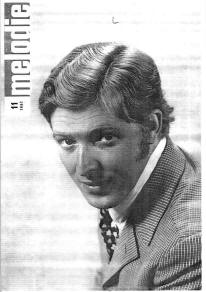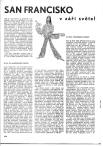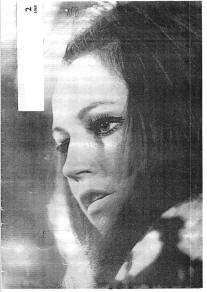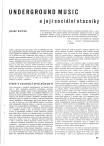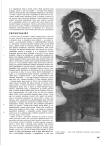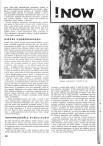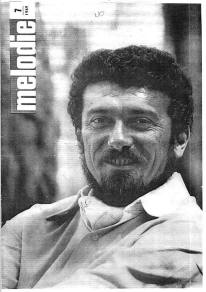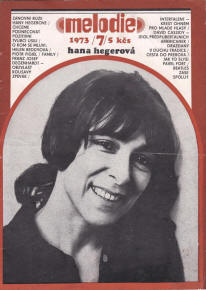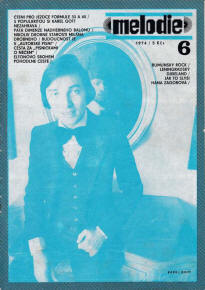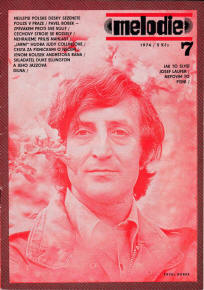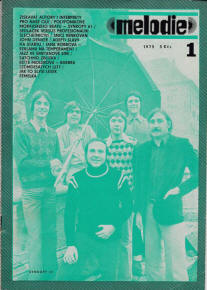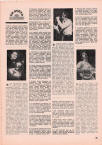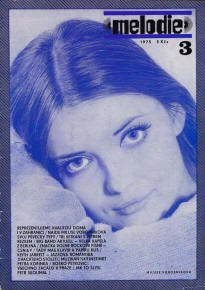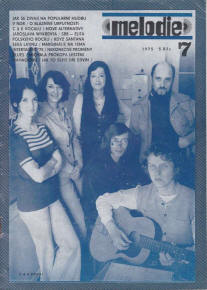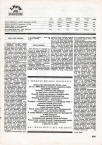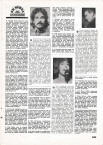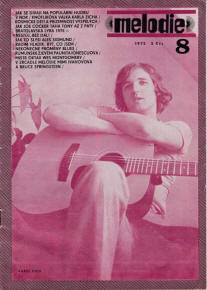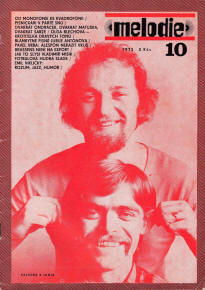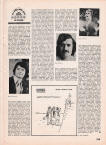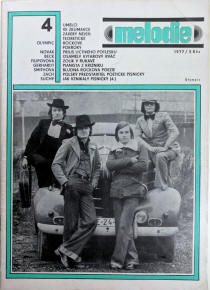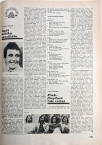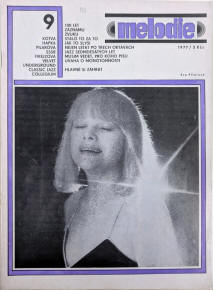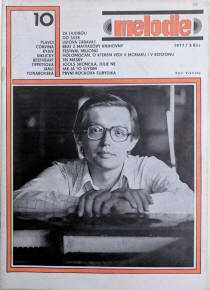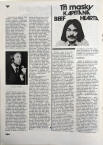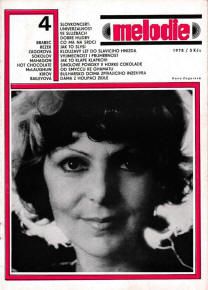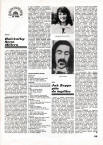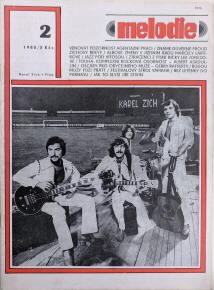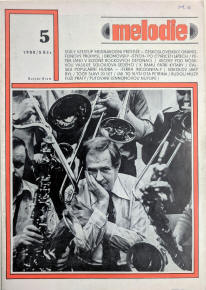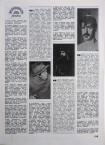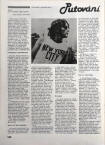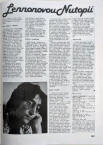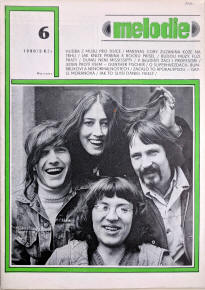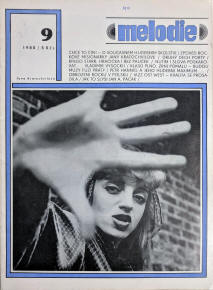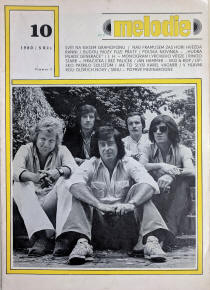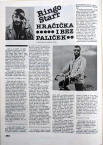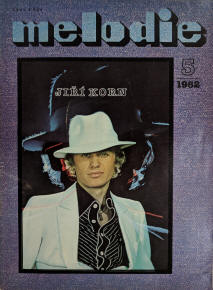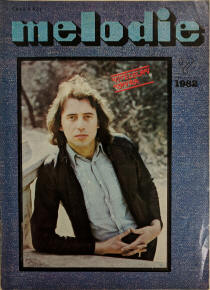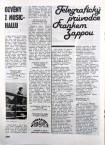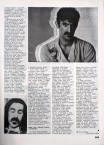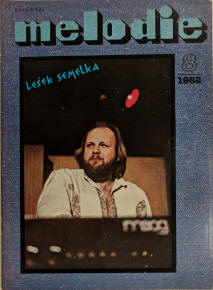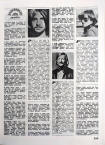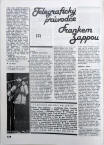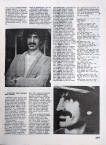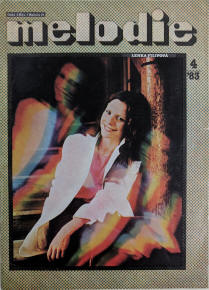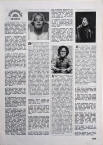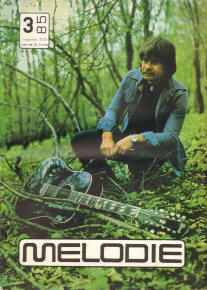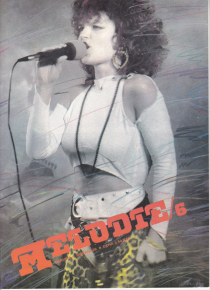Melodie
1969 February
Underground music a její sociální
otazníky
(Underground music and its social question
marks)
By Jozef Kotek, pp 37-40
1969 July
Splněné přání aneb Kdo je tady
vlastně blázen
(A wish come true or Who's really crazy here)
By Alexander Goldscheider, pp 200-202
This is the first interview by any Czech journalist
with Frank Zappa. Alexander Goldscheider did it in Fillmore
East before the 22 February 1969 shows. (read
more)
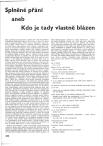
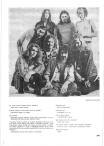
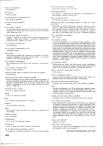
1973 July
Ze světa ([News] from
the world)
p 203
Jak ja to slyšim (How do I hear it? [kind of
a blind date])
By Pavel Fořt, p 217
p 203. Zappa has a new band
with Jean-Luc Ponty, George Duke, Bruce Fowler, Ralph Humphrey,
Ruth and Ian Underwoods.
p 217. Guitarist Pavel Fořt
Magic Fingers (F. Zappa), LP 200 Motels. Mothers Of Invention.
United Artists UDF 50 003
Automatic translation: It was
hard rock, which I like – long solos on one chord, that doesn't
suit me. The interludes with bass, guitar and vocals were very
imaginative. What was it? Well, after all. Perhaps I would listen
to the first part again . . . No overcombined, just simple forms.
And there are a lot of elements that you discover later — for
example, a piano that plays very nice things, but you only hear
them for the second or third time, and if I play it for the
fifth time, I'm sure I'll find something else.
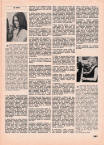
Source: Václav Pěnkava
Captain Beefheart has signed to Virgin and a
new, completely different LP Unconditionally Guaranteed
has been released. Some other artists, such as Zappa, have also
changed their style. His latest album, OverNite Sensation,
which should appeal to a wider audience, is good, but has not
lived up to its hype. New album Apostrophe with Cream
bassist Jack Bruce is coming.
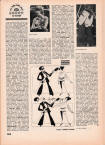
Source: Václav Pěnkava
On page 209 there is a quote from Zappa that,
loosely translated, reads something like this:
"Most young Americans don't think politically," says Frank Zappa,
one of those who most consistently transferred the folk song
motto of "songs about something" to rock. "They have too much
free time. And they only use it to enjoy themselves. But if
we could make them think, that would mean something. . . I feel
a certain responsibility that certain things must be said or
done in the context of the situation of our society."
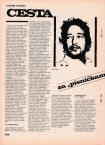
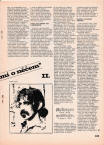
Source: Václav Pěnkava
The list of people who influenced Frank Zappa
on the Freak Out! album cover includes the Czech composer
Alois Hába.
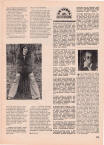
Source: Václav Pěnkava
Aleš Sigmund is Czech guitarist and multi-instrumentalist,
composer, arranger, band leader and producer.
Zomby Woof (F. Zappa). Mothers. Discreet K 41000
Automatic translation: Hachacha,
he starts as Zappa . . . Is that him? A real madhouse, that's
an original guy, that Frank Zappa. He has such crazy songs,
with completely unusual procedures, full of musical forms. At
times they are completely etudes, fast runs, twists in rhythmic
division. Just a kind of free pop, but written and calculated.
Is Zappa terribly afraid of the conventional concept of the
songs, he wants to be different than everything at all costs.
A kind of El Salvador Dali pop music. There is an interesting
moment about him: his work is also a reaction to the main streams
of American music. He ignores all the laws of the hit and so
despises them. It sounds similar to me like Sparks – the band
that has hit me in the ear the most lately.
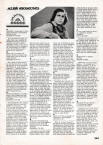
Source: Václav Pěnkava
1977 April
Albový glosar - Pink-floydová říše
zvířat (Album glossary - Animal kingdom of Pink
Floyd)
By Petr Dorůžka, p 121
Petr Hapka was a Czech composer, one of the most significant
composers of Czech film music scores.
Don't You Ever Wash That Thing (F.Zappa). Frank Zappa a
Mothers. Discreet 257 741 [probably Roxy & Elsewhere]
Automatic translation: A genius shines
from it. You can see that it is played & written by people
who know that at three o'clock they don't have to drop out of
the studio to catch a bus that takes them to the water, who
doesn't think they have to record, just think of music. They
wake up at night if the tone they played in the afternoon is
good, and the next day they will listen to it and then rewind
it and come back to it in three days. It's the same as a South
American shepherd taking a whistle & someone accidentally
rotates it, because that guy just thought about music, and it
doesn't matter if there are thousands of arranger loops or one
flute to which someone is blowing. It's just music that goes
from within, and no plagiarists can ever do it.
1977 October
Třy maski Kapitána Beefhearta (Captain
Beefheart's three masks)
By Petr Dorůžka, pp 304-305
Jiří
Stivín is a Czech flute player and composer.
Ian Underwood Whips It Out (Live On Stage in Copenhagen).
(Frank Zappa) Mothers Of Invention. LP Uncle Meat, Bizarre
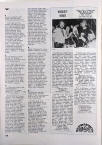
1980 May
Ze světa ([News] from
the world)
p 139
Putování Lennonovou Utopií (pt 2) (Wandering
Lennon's Utopia)
By Jiří Černý pp 146-147
1980 June
Budou múzy fúzi přát?
(6) (Will the muses want a fusion?)
By Lubomír Dorůžka, pp 173-175
O superhvězdach, Bumbrlíkovi a nenormálnostech
By Lubomír Dorůžka, p 183
Jak ja to slyšim (How do I hear it? [kind of
a blind date])
By Daniel Fikejs, p 185
The series of articles by L. Dorůžka about fusion
music was printed in all issues of 1980.
Half of the article on page 183 is about film Baby Snakes.
Daniel Fikejs
is a Czech composer. He's talking about "Dong Work For Yuda".
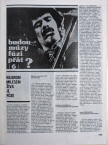
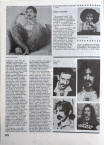
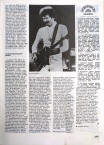
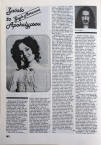
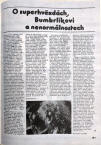
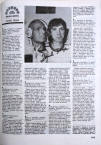
1980 September
Ringo Starr, hračička i bez paliček
(1), (Ringo Starr, a drummer even without drumsticks)
By Jiří Černý pp 270-271
Jak ja to slyšim (How do I hear it? [kind of
a blind date])
By Jan A. Pacák, p 281
The article on Ringo Starr contains references
to 200 Motels film.
Jan Antonín Pacák was a painter and musician. He is talking
about "Brown Shoes Don't Make It."
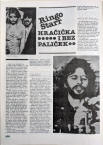
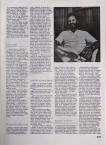
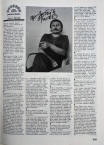
1980 October
Ringo Starr, hračička i bez paliček
(2), (Ringo Starr, a drummer even without drumsticks)
By Jiří Černý pp 302-303
Pavel Pelc is a Czech musician, bass player, singer, songwriter
and entrepreneur. He is talking about "I Promise Not To Come
Into Your Mouth".
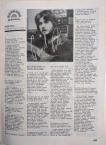
1982 July
Telegrafický průvodce Frankem Zappou
(Telegraph guide by Frank Zappa)
By Petr Dorůžka, pp 208-209
1982 August
Telegrafický průvodce Frankem Zappou
(2) (Telegraph guide by Frank Zappa)
By Petr Dorůžka, pp 238-239
This interview is translated from German
MusikExpress/Sounds
#11, November 1984.
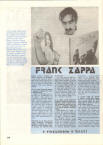
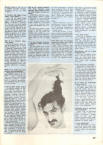
1990 June
On page 177 is a picture of Frank Zappa and Mejla
Hlavsa, the founder, bassist and main songwriter of the legendary
Czechoslovakian underground band
Plastic People Of The Universe.
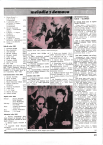
Source: Václav Pěnkava
